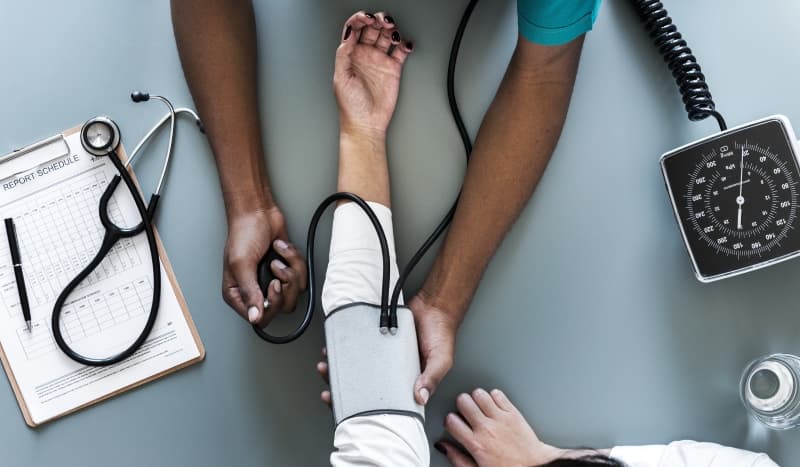How To Look After Your Heart

Pople are being encouraged to know more about their blood pressure and cholesterol levels in a bid to identify people at risk of cardiovascular disease.
What Is Cardiovascular Disease (CVD)?
Cardiovascular disease is the cause of one in four deaths in England. The term cardiovascular disease is a general term for a number of conditions that affect the heart or blood vessels.Four of the main types of CVD include; coronary heart disease, strokes,peripheral arterial disease and aortic disease.Coronary heart disease is when the flow of oxygenated blood to the heart muscle becomes blocked. This can lead to what is commonly known as a heart attack. Strokes are where the blood supply to the brain is cut off, peripheral arterial disease is when there is a blockage in the arteries to the limbs, usually the legs and aortic disease is a group of conditions that can arise when the aorta has been damaged.
Conditions That Affect CVD
High blood pressure and high cholesterol can be signs that something is wrong and can be contributors to CVD. Experts are therefore encouraging people over 40 to have health checks so that evasive action could be taken. These checks could be completed by your GP or some pharmacies are also carrying them out.
What Is High Cholesterol?
Cholesterol is a fatty substance known as a lipid.It is a vital substance for the normal functioning of the body. It is carried in your blood by proteins. Cholesterol levels should be 5mmol/L or less for healthy adults. If you have too much cholesterol then it can build up in the arteries which in turn will restrict blood flow to the heart, brain and entire body. Control of cholesterol levels are therefore vital in protecting the heart.
What Are the Causes Of High Cholesterol?
High cholesterol can be caused by eating too much saturated fat, foods like butter, cakes, biscuits and cheese. It is linked to smoking, as a chemical in smoking called acrolein, stops cholesterol getting to the liver and diabetes and high blood pressure can also be causes of high cholesterol.
What Is High Blood Pressure?
Blood pressure uses two numbers. the first is the systolic pressure at which heart pumps blood round your body and the second number is the distolic pressure which is a measure of the resistance to blood flow in the blood vessels.Your ideal blood pressure is usually between 90/60 mmHg and 120/80mmHg. High blood pressure is usually between 140/90mmHg or even higher.
If you have high blood pressure as you would imagine it puts extra strain on your blood vessels and organs which can lead to CVD.
What Are The Causes Of High Blood Pressure?
There is still research needed on what causes high blood pressure but it is clear that you are at risk if you are obese, eat too much salt and don't eat enough fruit and vegetables. There is also a link with people who don't exercise, who smoke and consume too much caffeine,
How Can You Reduce The Chance Of CVD?
There are ways you can reduce your chances of getting heart disease. they are to not smoke, to eat healthily and keep your weight to a healthy level and to also look at the amount of alcohol you consume. Certainly reducing the amount of fatty food you eat and eating more vegetables and wholegrain cereals will help prevent high cholesterol.Exercise is also very important. But as the research suggests if you can get an early warning that your blood pressure is high or your cholesterol levels are also too high you may be given an early warning of CVD so that you can take action to avoid serious heart disease.
You Might Like
How To Measure Your Blood Pressure
Ever wondered why your blood pressure is so important? Want to know how to measure it and why you should? Read our quick guide to find out more.Look After Your Prostate
Prostate care. How to look after your prostate and tips to help you avoid future prostate health issues.How Best To Look After Your Brain
The latest research suggests that learning new skills is great for our brains, alongside diet and exercise. We examine the latest research to help delay the onset of diseases like dementia.How To Keep Your Heart Young
We all know that living a sedentary lifestyle can be really bad for our hearts. But research suggests that if we exercise properly before the age of 65 we can rejuvenate out hearts.High Street Beauty Treatments To Look Fabulous
Want to look your very best? Check out these high street beauty treatments that can help make you look fabulous. Seriously!
Useful Websites
- King's College London
Leading London university offering key courses including Medicine and Law. A top college within the heart of the city. - Favourite Plus
Imports and distributes pulse oximeters, portable pulse oximeters, finger pulse oximeters, handheld pulse oximeters, oxygen saturation meters, handheld ECG-EKG monitors and fetal dopplers. - Wickwoods Country Club, Hotel and Spa
Offering a number of first class facilities including a swimming pool, restaurant, spa and gym in the heart of the Sussex Countryside. - 111 Harley Street
Exclusive cosmetic surgery at one of the UK's leading cosmetic surgeries in the heart of London. We are specialists in breasts, liposuction and penis surgery. - Heart at Work
Inspire and support individuals and organisations to create work based on the qualities of the human spirit - love, creativity, joy, abundance, caring, contribution, happiness, pace of mind, inner and - Celtic Heart
Informative and interactive examples of Celtic art, history, heroes, god and myths, referenced as to its source and history whenever possible - Add Your Website Here